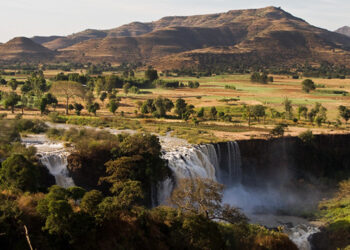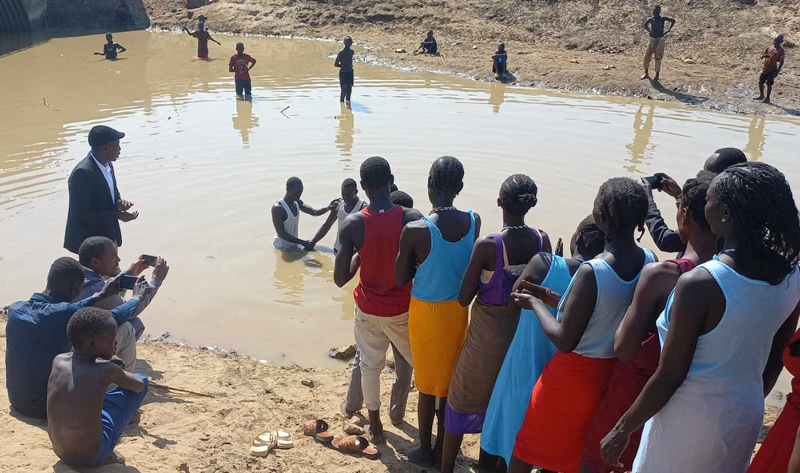By Melissa Nordell —

Nuraldaim Hassan was raised as a Muslim in a Muslim area of Sudan, at some distance from any Christian influences.
One day a man traveling from Gofa stopped at Nuraldaim’s home along the roadside during a rainstorm. Nuraldaim’s family welcomed the man into their home to rest. After the traveler moved on, Nuraldain noticed the man had left behind a Bible.
Curious, Nuraldain began to read the Bible over the next several days. Later, Nuraldaim’s father saw him reading and asked who gave him “that book.” Nuraldaim told him the traveler left it behind. The father took the Bible and forbade his son to read it again.
However, one of Nuraldaim’s friends from the Jumium tribe happened to be a Christian and told him more about Christ.
Later, Nuraldaim visited a church with his friend but did not accept Christ as his Savior. His heart, however, was being drawn to know more about Jesus and the Christian life.
A leader at the church told him that there was an opportunity to go to Bible school. Nuraldaim and some of his friends agreed to attend even though he still had not accepted Christ. It was not until after he was at Bible school that Nuraldaim accepted Jesus as His Savior and was baptized.
Nuraldaim still does not know who left the Bible in his home but knows it was God’s amazing way to reach him. Now, he is a leader in the group of Blue Nile Community Churches in the Blue Nile region of Sudan.
The Blue Nile originates at Lake Tana in Ethiopia, flowing about 900 miles through Ethiopia and Sudan. At Khartoum, Sudan, the Blue Nile joins the White Nile and together (as the Nile) flow through Egypt to the Mediterranean Sea .
Those traversing the Blue Nile to the Nile River pass through civil war conflict zones, regions known for bandits, multiple hazards, and rapids.
After Sudan became independent, the new regime began Islamist rule. This exacerbated the rift between the Islamic North (the seat of government) and the Christians in the south. Differences in language, religion, and political power erupted in a civil war between opposing forces. After mass numbers of death from war and starvation, eventually the independence of South Sudan was established in 2011. However, much fighting and opposition continued, and some report the situation has worsened.
Sudan is considered a “least developed country,” ranking 172 on the Human Development Index. A large majority of Sudan is dry and over 60% of Sudan’s population lives in poverty.
It is interesting to note that the Kingdom of Kush was an ancient Nubian state centered on the confluences of the Blue Nile and White Nile rivers, also known as the Kushite Empire, or simply Kush (Cush) named in the Bible. Did you know that there are pyramids in Sudan in this area near the Nile that were built by three Kushite kingdoms?
In the Bible the kingdom of Cush was named after Cush, the oldest son of Ham (Genesis 10:6) who was one of the three sons of Noah that survived the Great Flood. Cush became the father of Nimrod who established the Babylonian Empire (Genesis 10:8–10). Much later, Moses married a descendant of Cush which caused Aaron and Miriam to speak against him (Numbers 12:1).
As of 2023, over 5.8 million people were internally displaced and more than 1.5 million others have fled Darfur, Sudan as refugees with many civilians reported dead as part of the Masalit massacres.
The Blue Nile Churches host people from Darfur who have experienced genocide, massacres, famine, jihad, rape, and coups as well as from many other countries around them. There is a vast need for the gospel, food, healing from trauma, and salvation to the people in that area.

The Blue Nile Community Churches in the Blue Nile region of Sudan continue to live in the midst of an amazing biblical history, believing in God’s Word that: “Nobles shall come from Egypt; Cush shall hasten to stretch out her hands to God” in Ps 68:31 (ESV)
To learn more about the Blue Nile Community Church, go here




wow. that’s amazing
Thank you Dear for sharing may God bless all of you as we serving to accomplish the great commission.
[…] The full story includes more context about Sudan. […]
Comments are closed.